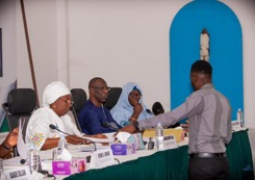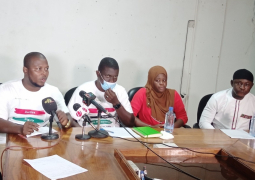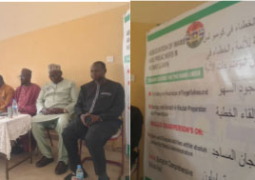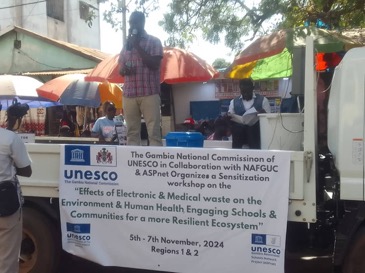
The initiative, which targets women and youth, comes amid a rise in the use of waste electronics and other waste products in the country, some of which officials said contain dangerous chemicals that are detrimental to the well-being, health of people and even to the wider environment.
Medical waste, according to officials, is a huge environmental problem.
According to records, annually an estimated 16 billion injections are administered worldwide, but not all the needles and syringes are properly disposed off afterwards.
Thus, they added, it is imperative to raise more awareness to address this issue which is in line with the approved e-waste project under UNESCO Participation Programme for this biennium.
Addressing the gathering at the Serrekunda Market, Borry Mansa Demba, a programme manager at the National Environment Agency (NEA), reminded communities about the hazardous effects of medical and electronic waste and how communities are contributing to the accumulation of these waste stockpiles.
He called on people to be wary of expired medical items and used bandages, syringes and other hazardous products in communities, saying: “All these pose challenges to the sound management of the environment.”
Demba also made reference to the alarming surge in electronics products and toys in the country and advised people on how to safely dispose of some of those electronic gadgets.
He added: “Even old cars parked at garages all pose threats to the environment as some of those equipment contain substances that are harmful to the environment.”
Lamin Jarju, national ASP net Coordinator who also worked at the UNESCO, pointed out that the project is awareness raising designed on electronics and medical waste.
“We are targeting youth but also women and young men. We all know about the issue of waste all over the globe. But in the Gambia in particular, waste management has become a threat in our country given the fact that we don’t have landfills where we can responsibly dispose of waste.”
In addition, Jarju also observed that electronics and medicals are problematic in view of the surge during the Covid-19 pandemic, where people had to handle medical products and other materials emanating from the pandemic.
“So, we thought it wise and prudent to come up with a project where we can raise the awareness of people on how to handle waste and also possibly dispose of it in a way that it will not harm the earth and humans.”
As part of the awareness raising, he said, they organised training for school coordinators, who are part of the ASP network and Clubs for UNESCO and even students on the issue.
Read Other Articles In National News
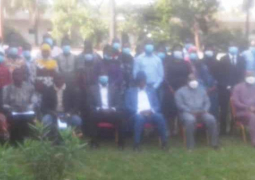
Undermining democracy can turn the country towards conflict – IEC chairman
Dec 30, 2020, 2:09 PM
